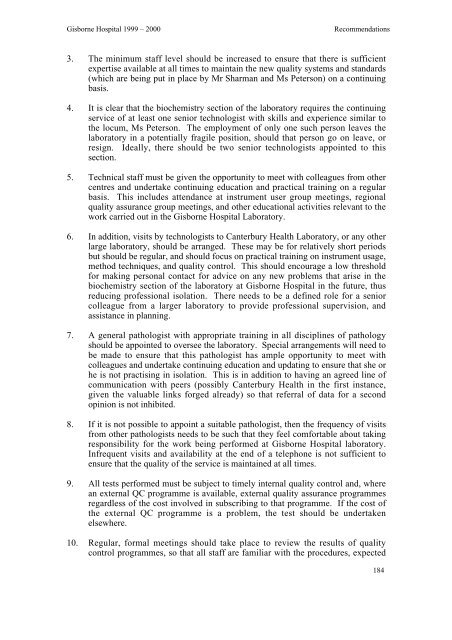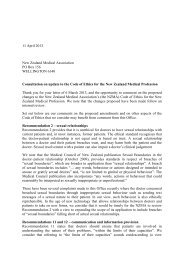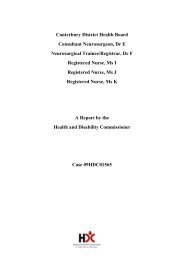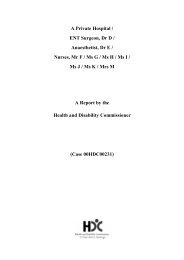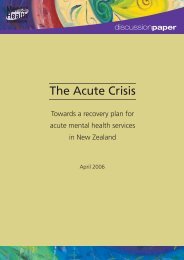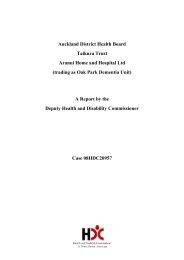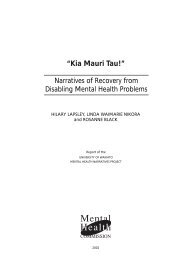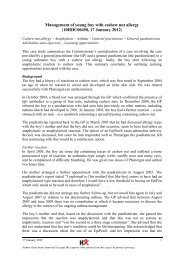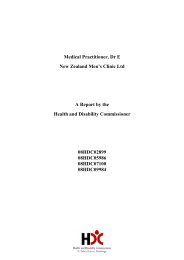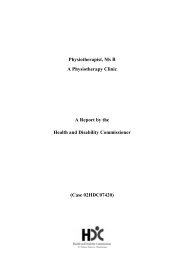Gisborne Hospital Report - Health and Disability Commissioner
Gisborne Hospital Report - Health and Disability Commissioner
Gisborne Hospital Report - Health and Disability Commissioner
You also want an ePaper? Increase the reach of your titles
YUMPU automatically turns print PDFs into web optimized ePapers that Google loves.
<strong>Gisborne</strong> <strong>Hospital</strong> 1999 – 2000<br />
Recommendations<br />
3. The minimum staff level should be increased to ensure that there is sufficient<br />
expertise available at all times to maintain the new quality systems <strong>and</strong> st<strong>and</strong>ards<br />
(which are being put in place by Mr Sharman <strong>and</strong> Ms Peterson) on a continuing<br />
basis.<br />
4. It is clear that the biochemistry section of the laboratory requires the continuing<br />
service of at least one senior technologist with skills <strong>and</strong> experience similar to<br />
the locum, Ms Peterson. The employment of only one such person leaves the<br />
laboratory in a potentially fragile position, should that person go on leave, or<br />
resign. Ideally, there should be two senior technologists appointed to this<br />
section.<br />
5. Technical staff must be given the opportunity to meet with colleagues from other<br />
centres <strong>and</strong> undertake continuing education <strong>and</strong> practical training on a regular<br />
basis. This includes attendance at instrument user group meetings, regional<br />
quality assurance group meetings, <strong>and</strong> other educational activities relevant to the<br />
work carried out in the <strong>Gisborne</strong> <strong>Hospital</strong> Laboratory.<br />
6. In addition, visits by technologists to Canterbury <strong>Health</strong> Laboratory, or any other<br />
large laboratory, should be arranged. These may be for relatively short periods<br />
but should be regular, <strong>and</strong> should focus on practical training on instrument usage,<br />
method techniques, <strong>and</strong> quality control. This should encourage a low threshold<br />
for making personal contact for advice on any new problems that arise in the<br />
biochemistry section of the laboratory at <strong>Gisborne</strong> <strong>Hospital</strong> in the future, thus<br />
reducing professional isolation. There needs to be a defined role for a senior<br />
colleague from a larger laboratory to provide professional supervision, <strong>and</strong><br />
assistance in planning.<br />
7. A general pathologist with appropriate training in all disciplines of pathology<br />
should be appointed to oversee the laboratory. Special arrangements will need to<br />
be made to ensure that this pathologist has ample opportunity to meet with<br />
colleagues <strong>and</strong> undertake continuing education <strong>and</strong> updating to ensure that she or<br />
he is not practising in isolation. This is in addition to having an agreed line of<br />
communication with peers (possibly Canterbury <strong>Health</strong> in the first instance,<br />
given the valuable links forged already) so that referral of data for a second<br />
opinion is not inhibited.<br />
8. If it is not possible to appoint a suitable pathologist, then the frequency of visits<br />
from other pathologists needs to be such that they feel comfortable about taking<br />
responsibility for the work being performed at <strong>Gisborne</strong> <strong>Hospital</strong> laboratory.<br />
Infrequent visits <strong>and</strong> availability at the end of a telephone is not sufficient to<br />
ensure that the quality of the service is maintained at all times.<br />
9. All tests performed must be subject to timely internal quality control <strong>and</strong>, where<br />
an external QC programme is available, external quality assurance programmes<br />
regardless of the cost involved in subscribing to that programme. If the cost of<br />
the external QC programme is a problem, the test should be undertaken<br />
elsewhere.<br />
10. Regular, formal meetings should take place to review the results of quality<br />
control programmes, so that all staff are familiar with the procedures, expected<br />
184


